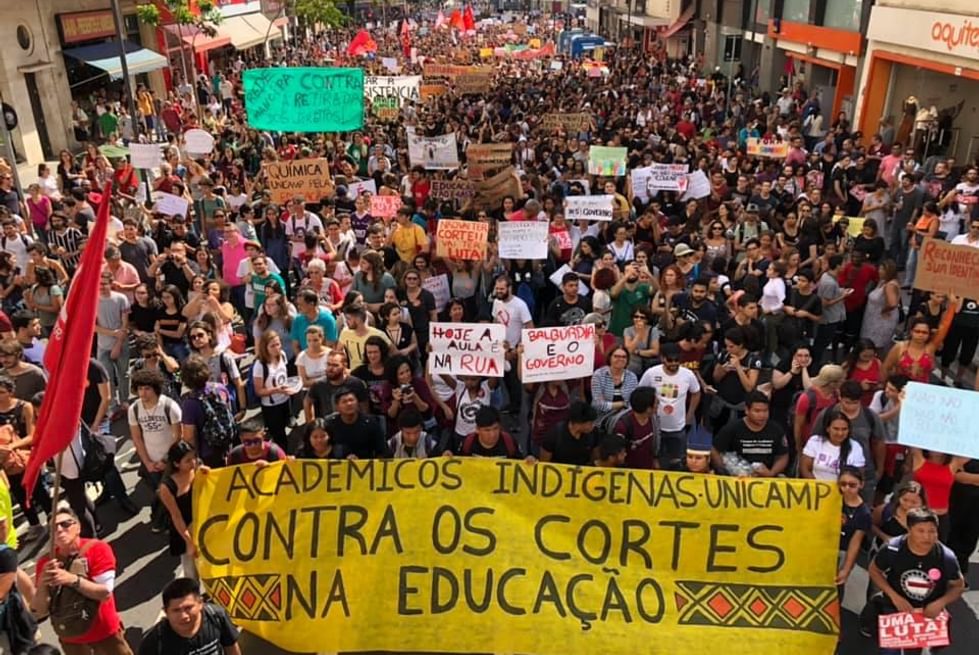Bolsonaro, the Evangelicals, and the Brazilian Crisis
From the Series: Bolsonaro and the Unmaking of Brazil
From the Series: Bolsonaro and the Unmaking of Brazil

Brazil is in widespread crisis. Triggered by the street protests of June 2013, the crisis was polarized during the 2014 elections, deepened by the impeachment of Dilma Rousseff in 2016, and exploded by the election of extreme right-wing politician Jair Messias Bolsonaro in 2018. This is not just a political crisis, running parallel to an economic crisis; it has legal implications (the 1988 Constitution is at stake), societal implications (fissures in interpersonal relations have been frequent), and cultural implications (affecting issues of identity, values, and behaviors). In short, the crisis is a total social fact.
A significant portion of Brazil’s evangelical population is part of a global conservative wave in public debate that articulates, at different levels, at least three lines of social forces: economically (neo)liberal, punitive and repressive, and morally regulatory.
In the first line, Jair Bolsonaro’s candidacy captured a growing current of opposition to compensatory policies, which aim to alleviate poverty and invest in the human capital of individuals and families with low social and economic capital. Critics of such policies would argue for the state’s appreciation for and reward of merit and individual effort, as opposed to a state that offers too much protection and discourages personal initiative.
Importantly, this discourse resonates with the neopentecostal theology of prosperity, which encourages the faithful to follow an entrepreneurial approach to financial life in order to generate personal economic stability and allow for the consumption of material goods. Coinciding with an increased reliance on informal and precarious work in Brazil during the economic recession of the 1980s and 1990s, and with the expansion of consumption in the 2000s, theology of prosperity is not just about giving meaning to actions, but also encouraging the believer to cultivate a particular attitude and disposition to economic life. The notion that material prosperity results from monetary ritual sacrifices and entrepreneurial attitudes is valued by neopentecostalism and adopted as an economic ethic.
The second line of social force refers to a series of political movements, collective demands and governmental measures that point to more repressive and punitive actions by the state security apparatus. This line of force tends to find considerable popular support. The majority of those who speak on behalf of evangelicals support repressive and punitive security policies. They are part of a broad movement that works to further criminalize non-conservative practices, such as having abortions or using cannabis. Conservative evangelicals have supported political efforts to reduce the age of criminal responsibility and increase the length of jail sentences, but for theological reasons they are much more reluctant to support the death penalty. When there is no conflict with their religious principles, they condone greater state violence.
Finally, the third line of force acts to contain the advances of secularism and more liberal behaviors and values. The most visible protagonists of moral conservatism in recent years have been those evangelicals, Pentecostal and non-Pentecostal, who have entered disputes over public morality by calling for the need to regulate bodies, behaviors, and family bonds (e.g., opposing marriage and the adoption of children by gay couples). Their concern is not only the protection of the morality of evangelicals, but the struggle to have it inscribed in the legal order of the country.
The arguments of the Christian majority (largely Catholic, with Protestantism rapidly growing in the last decades) have often appeared in the speeches of political players to justify curbing progressive agendas. Anchored in a sort of moral panic resulting from a supposed (homosexual and feminist) “threat to the traditional family,” this discourse is oblivious to the social changes of recent decades concerning sexuality, gender, and reproduction. Examples of this conservative agenda are the “Gay Cure” project, championed by an Evangelical congressman, which legalizes psychological treatment for people who want to change their homosexual behavior, or the Ministry of Foreign Affairs’s actions during the first year of Bolsonaro’s government to remove the word gender from international agreements.
Historically, evangelicalism has grown in Brazil under the protective principle of religious freedom and freedom of conscience in the face of Catholic hegemony. However, as they have grown demographically and entered spaces of power, the most conservative vectors of Brazilian evangelism have sustained an understanding of democracy focused more on the will of the Christian majority than on the protection of minorities or differences.
All of these factors have delivered “the evangelical vote” to Bolsanaro’s conservative party (see table 1).
Table 1. Electorate distribution according to religious affiliation.
Religion | Votes for Bolsonaro | Votes for Haddad | Difference |
Catholic | 29,795,232 | 29,630,786 | 164,446 |
Evangelical | 21,595,284 | 10,042,504 | 11,552,780 |
Afro-brazilian | 312,975 | 755,887 | -442,912 |
Espírita | 1,721,363 | 1,457,783 | 263,580 |
Other religion | 709,410 | 345,549 | 363,862 |
Without religion | 3,286,239 | 4,157,381 | -871,142 |
Atheist and agnostic | 375,570 | 691,097 | -315,527 |
Total | 57,796,074 | 47,080,987 | 10,715,087 |
Source: Datafolha Poll, Oct. 25, 2018.
Looking further at Datafolio’s poll, the bipartisan voting among Catholics is impressive. Despite decreasing numbers of practicing Catholics, Catholicism is still the great cultural mediator of the country. The contrast with Catholics makes the conservative evangelical voting block all the more striking.
Bolsonaro’s candidacy articulated pillars of conservativism, including a demand for security and a call to return to “morality” in social customs, while disqualifying the protective state for being corrupt and paternalistic. Not all conservatives are evangelical, just as not all evangelicals are conservative. However, the more hegemonic evangelical tendency is constituted by and, at the same time, is constituent of this ongoing conservative wave in Brazil that was instrumental in the election of an extreme-right candidate.
An extended version of this essay will be published in the section "Currents: Ethnographic Views of Brazil's (New) Authoritarian Turn” in HAU: Journal of Ethnographic Theory 10, no. 1 (2020).